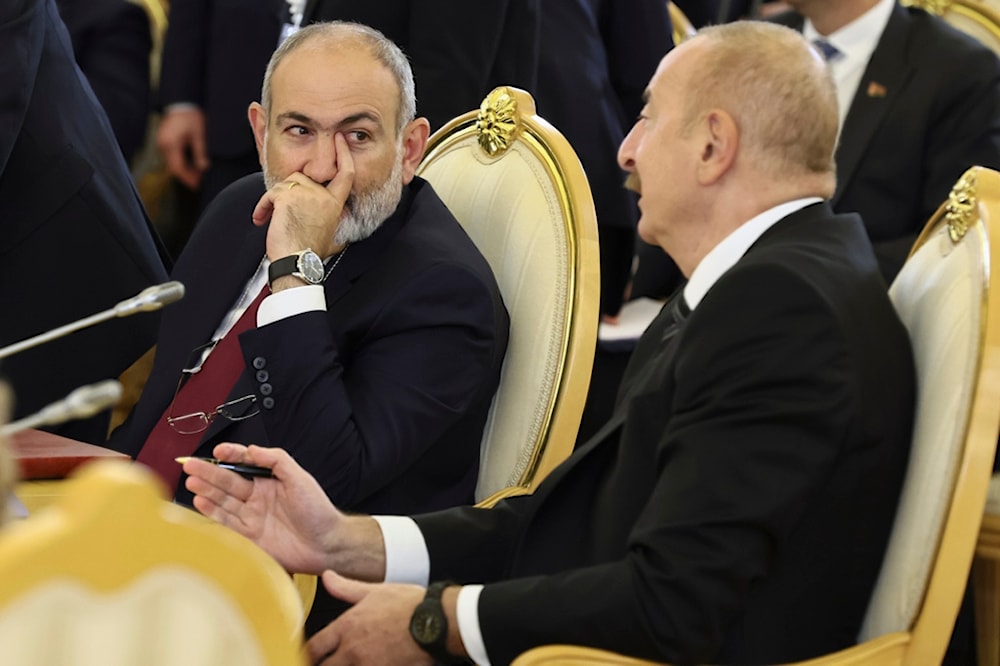Armenia, Azerbaijan reach draft peace agreement, few obstacles remain
Both Armenia and Azerbaijan confirmed that they have finalized the text of a peace agreement, but its signing remains uncertain due to Azerbaijan's demand for Armenian constitutional changes and ongoing political tensions.
-

Armenian Prime Minister Nikol Pashinyan, left, speaks with Azerbaijani President Ilham Aliyev during an extended meeting at the summit of the heads of state of the Commonwealth of Independent States (CIS) at the Kremlin in Moscow, Russia, Tuesday, Oct. 8, 2024. (Sergei Ilnitsky/Pool Photo via AP)
Armenia and Azerbaijan have reached a significant milestone in their efforts to end decades of conflict, with both sides announcing that they have finalized the text of a peace treaty. The agreement, which aims to formally conclude hostilities between the two South Caucasus nations, marks a rare moment of progress in what has been a fraught and prolonged negotiation process.
Armenia's Foreign Ministry confirmed that the draft peace agreement is now complete from its side. "The peace agreement is ready for signing. The Republic of Armenia is ready to start consultations with the Republic of Azerbaijan on the date and place of signing the agreement," the statement read.
Azerbaijan's Foreign Ministry also acknowledged the development, stating, "We note with satisfaction that the negotiations on the text of the draft Agreement on Peace and the Establishment of Interstate Relations between Azerbaijan and Armenia have been concluded."
Despite this advancement, the timing of the treaty's formalization remains uncertain. Baku insists that before the agreement can be signed, Armenia must amend its constitution, which it claims contains implicit territorial assertions.
Yerevan denies these allegations, though Armenian Prime Minister Nikol Pashinyan has repeatedly stated that constitutional changes are necessary and has proposed a referendum to implement them. No date has yet been set for this process.
Fragile truce
Speaking to journalists, Pashinyan noted that the agreement includes a provision preventing foreign personnel from being stationed along the border between the two countries. Russia's TASS news agency reported his remarks, suggesting that this condition would likely affect both the European Union's civilian monitoring mission, which Azerbaijan has previously criticized, and Russian border guards currently deployed in certain areas of Armenia.
The conflict between Armenia and Azerbaijan has its roots in the late 1980s when tensions over Nagorno-Karabakh led to widespread displacement. The violence resulted in the mass expulsion of ethnic Azeris from Armenia and Armenians from Azerbaijan.
Following Azerbaijan's military operation in September 2023, which brought the contested region back under Baku's control, nearly all of the 100,000 ethnic Armenians in Karabakh fled to Armenia, where they remain as refugees.
Read more: Armenia confirms Nagorno-Karabakh is Azerbaijani sovereign territory
While both governments have repeatedly expressed a desire to reach a formal peace deal, negotiations have been difficult, and relations remain fragile. Their shared border, spanning approximately 1,000 kilometers (621 miles), remains closed and heavily fortified.
The tension was further exacerbated in January when Azerbaijani President Ilham Aliyev described Armenia as a "fascist" threat that needed to be eliminated—a statement that Pashinyan interpreted as a possible pretext for renewed hostilities.
The finalization of the agreement represents a step forward in the peace process, but political challenges and mutual distrust continue to pose obstacles to a lasting resolution.

 3 Min Read
3 Min Read








